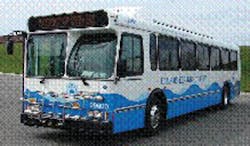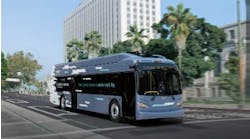Blue Water Area Transit has been awarded a $1.1 million grant to provide commuters with improved services for one more year. The agency will continue bus service along a regional commuter route to Macomb County and extended hours designed to help commuters get to and from work.
BWAT will receive $1,114,060 in grant funding from the Job Access and Reverse Commute program for Fiscal Year 2015 (October 1, 2014 – September 30, 2015).
Since JARC started in Fiscal Year 2008, the program has awarded BWAT more than seven million dollars ($7,388,433). JARC does not require any local contributions and the Michigan Department of Transportation will provide all of the Fiscal Year 2015 funding.
“Local residents gain the chance to work in cities along the St. Clair River and as far away as Downtown Detroit and Dearborn,” says Jim Wilson, BWAT general manager. “What’s really great is that they pay our regular 75-cent fare to travel this far.”
The number of riders who use JARC services has more than tripled (from 51,561 to 166,357) during the past six years.
“The growing popularity of these services tells us we’re doing something right for the community," says Linda Bruckner, Blue Water Area Transportation Commission Board chair and Fort Gratiot Township trustee. “Greater access to jobs gives more people the freedom to live and raise their families here.”
JARC funding supports a commuter route to Macomb County (23 Mile Road and Gratiot Avenue) for the usual fare of 75 cents (35 cents for seniors who are at least 60 years old).
Commuters can travel via an I-94 express route or an M-29 local route that stops in Marysville, St. Clair, Algonac, Clay Township, Pearl Beach, Ira Township, Anchorville, and New Baltimore. At no additional charge, commuters can then connect with the regional SMART transit system to reach Downtown Detroit, Wayne State University, or suburban cities as far away as Dearborn.
JARC funding also supports extended local service hours. Some bus routes start as early as 5:15 a.m. and run as late as 11:00 p.m. during the week and 3:00 a.m. on Fridays and Saturdays. These longer hours are designed to help commuters connect with Macomb County routes and reach jobs with early morning or late evening shifts.
BWAT purchased its first 40-foot coach in 2010 to transport up to 38 passengers on the commuter route. The Orion V bus runs on compressed natural gas and is designed for comfort with high-back, reclining, upholstered seating and air suspension.
Blue Water Area Transit continues a proud tradition of innovation in public transit that has served Port Huron for more than a century. Port Huron was one of the nation’s first communities to operate an electrified transit system in the 1880s and one of the first to operate motor coaches when they became popular in the 1930s. Following an eight-year hiatus, the current bus service began in September 1976. Since then, BWAT has carried more than 26 million riders.
BWAT started producing its own compressed natural gas in 1996 and now ranks as Michigan’s largest producer of the alternative fuel. It runs the state’s largest fleet of alternative fuel buses.



